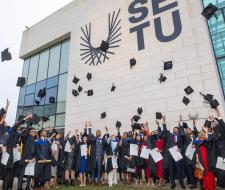Higher education in Dublin 2026
- The Advantages of Studying at Higher Education Institutions in Dublin
- Higher Education in Dublin: A Comprehensive Overview
- The Structure of Higher Education in Dublin
- Universities in Dublin for Russian Students
- Financial Aid and Scholarships in Dublin's Universities
- Cost of Higher Education in Dublin
- Literature and references
This content was developed and approved with active participation of Sam Jones.
In the process of preparing the material, we referenced the following sources:
- https://en.wikipedia.org/wiki/Third-level_education_in_the_Republic_of_Ireland
- https://www.independent.ie/irish-news/education/trinity-climbs-27-places-to-134th-in-global-rankings-but-poor-ratio-of-students-to-staff-hold-ireland-back/a863178532.html
-
 from 10500.00 € / year
from 10500.00 € / year -
 #285 in Top Performers on Social Mobility
#285 in Top Performers on Social Mobility IrelandDublinCurrently watching: 10from 7250.00 € / semester
IrelandDublinCurrently watching: 10from 7250.00 € / semester -
 from 18153.00 € / year
from 18153.00 € / year -
 from 200.00 € / week
from 200.00 € / week -
 from 3100.00 € / year
from 3100.00 € / year -
 #7 in Best Global Universities in Ireland
#7 in Best Global Universities in Ireland IrelandDublinCurrently watching: 2from 13828.00 $ / year
IrelandDublinCurrently watching: 2from 13828.00 $ / year -
 from 12500.00 € / year
from 12500.00 € / year -

-
 #7 in Best Global Universities in Ireland
#7 in Best Global Universities in Ireland IrelandDublinCurrently watching: 1from 13265.00 $ / year
IrelandDublinCurrently watching: 1from 13265.00 $ / year -
 from 6000.00 € / year
from 6000.00 € / year
Ireland is a magnificent green island, rich in historical sights, medieval castles, beautiful national parks, museums, lakes, known for its delicious cuisine. The country is inhabited mainly by the indigenous population, the society is friendly to all visitors, including students.
Dublin is a prosperous, safe city with a developed infrastructure. Travelers come to it to visit the most picturesque places. Also, every year a large number of students from all over the world strive for Dublin to receive a quality European education.
Universities in Dublin have a reputation as the most prestigious educational institutions, have a good material and technical base, modern equipment. Also foreign students are provided with the opportunity to attend effective language preparation courses, allowing them to enter a university. In addition, academic preparation in popular specialties is conducted, creating all the necessary conditions for making a successful career.

What firstly should be considered when choosing a university?
It depends on the student - everyone determines the most important criteria for himself. I would advise you to take several rankings and compare them with each other, plus take into account the cost of the course, the location of the university and its scale, the percentage of graduates' employment. See where graduates continue their studies or where they go to work.
Alternative destinations
The Advantages of Studying at Higher Education Institutions in Dublin
Dublin's universities and colleges have gained popularity due to their friendly and safe environment, high quality educational programs. Also, with a diploma from Dublin university, a graduate can enter any university of the world. Compared to the UK, tuition fees at universities in Dublin are lower. However, it does not affect the quality of education, providing a unique opportunity to study in a multinational student community. Higher education system of Dublin is featured by a wide variety of studying programs. In addition, Dublin's institutions prepare in-demand professionals, providing senior students with the opportunity to work during studying. So, upon completing studies, graduates can get a job in Ireland.
Higher Education in Dublin: A Comprehensive Overview
The system of higher education in Dublin is represented by universities, institutes, and colleges. Each institution is featured by its own educational programs, requirements and specifics of studying. So, each student can choose an appropriate option according to his individual preferences and future goals. Ireland is home to 7 public universities, 13 institutes of technology, and 8 teacher preparation colleges, along with several private colleges and business schools. No matter what institution type a student chooses, he will be offered a wide choice of undergraduate programs.
Trinity College Dublin, a prestigious and highly sought-after institution, consistently ranks in the top 50 universities globally. Other popular institutions include Dublin Institute of Technology, Griffith College, and St. Andrew’s College, all welcoming international students.
Compared to Dublin universities, colleges and institutes usually make an emphasis on developing practical skills. Upon completing studies, diplomas are highly valued by employers in Ireland. The following directions of studying have gained the most popularity: humanities, social sciences, public health, medicine, engineering, natural sciences, economics, and more.
The Structure of Higher Education in Dublin
The higher education system in Ireland comprises three levels: undergraduate (bachelor's degree), postgraduate (master's degree), and doctorate. Bachelor's degrees are offered as ordinary or honors, with the latter requiring a competitive entry process and higher academic standards.
Bachelor's Degree in Dublin
A bachelor's program in Dublin typically lasts four years. Upon completion, students receive a degree in various fields like arts, engineering, education, business, or international development. Many programs include internships, ensuring graduates are skilled professionals with practical experience. After graduation, students have the opportunity to stay in Ireland for a year to seek employment and apply for residency.
Master's Degree in Dublin
To earn a master's degree, graduates must undertake intensive one to two-year programs, including publishing research. Postgraduates can stay in Ireland for two years after receiving their degree to find work in their field.
Doctoral Programs
Doctoral candidates must have completed both undergraduate and postgraduate studies and typically spend three years on their research.
Universities in Dublin for Russian Students
Dublin's universities offer quality and affordable education compared to the UK or USA. Russian students can pursue undergraduate and postgraduate programs in state universities, technology institutes, and private colleges. The academic year is divided into two or three semesters, starting in early September and ending in late June, with summer, Christmas, and Easter breaks.
Dublin universities offer top specialties in medicine, education, IT, business, finance, journalism, engineering, mathematics, law, design, international relations, and political science. They allow students to work up to 20 hours per week, providing both additional income and practical experience.
Financial Aid and Scholarships in Dublin's Universities
Many universities in Dublin offer financial assistance to students with high academic achievements. Scholarships available to international students can cover from 10% to 100% of tuition fees, with eligibility often based on academic performance, sporting achievements, or contributions to the student community.
In addition to academics, students engage in sports, arts, social activities, and volunteering. Facilities include sports complexes, creative studios, clubs, computer labs, modern scientific laboratories, libraries, cafés, theaters, and relaxation rooms.
Cost of Higher Education in Dublin
The cost of higher education in Dublin varies. For medical students, fees start from €30,000 per year, while humanities range from €15,000 to €20,000 per year. Private colleges charge about €9,000 to €12,000 per year, and technology institutes start from €9,000 to €13,000 per year. Public university fees for bachelor's programs range from €11,000 to €30,000 per year, and master's programs start from €6,000 per year.
Additional expenses include accommodation, transport, food, personal expenses, and various activities.
Learning programs-summary information
| Name | Meaning | Equivalent | Min. age | Duration, years |
Next stage | Cost |
|---|---|---|---|---|---|---|
| GCSE | General certificate of secondary education | secondary education (non-accomplished) | 14 | 1–2 | A-Levels | 15,000 USD+ |
| A-Levels | Advanced level | secondary education (accomplished) | 16 | 2 | University | 15,000 USD+ |
| BTEC | Business and Technology Education Board | secondary special education | 14 | 2–3 | University/ work | 15,000 USD+ |
| Oxbridge Preparation | Preparing for Oxford and Cambridge | secondary education (accomplished) | 17 | 1 | University | 15,000 USD+ |
| International Baccalaureate | International baccalaureate | secondary education (accomplished) | 16 | 2 | University | 18,000 USD+ |
| Foundation/ Pathway Year | Preparatory year | admission to the 1st year of university | 17 | 1 | University | 14,000 USD+ |
| NCUK | The Northern consortium | 2 year university | 17,5 | 1 | 2 year University of NCUK | 13,000 USD+ |
| Special Preparation (Medics/Math/Business) | Specialized training | - | 14 | optional | optional | 4,000 USD+ |
| Academic English | Academic English | Language school | 8 + | 6–12 months | School or University | 8,000 USD+ |
Top 14 best universities in Switzerland 2026
| 1 | Glion Institute of Higher Education Switzerland |
| 2 | Les Roches International School Montana |
| 3 | César Ritz Colleges Switzerland |
| 4 | IHTTI School of Hotel Management |
| 5 | Ecole Hoteliere de Lausanne |
| 6 | Geneva Business School |
| 7 | HIM Hotel Institute Montreux |
| 8 | Swiss Hotel Management School |
| 9 | Webster University Geneva |
| 10 | Business and Hotel Management School |
| 11 | Luzern IMI |
| 12 | Swiss Hotel Management School (SHMS) Caux |
| 13 | International University in Geneva |
| 14 | Culinary Arts Academy Switzerland |
Top 10 best universities in Netherlands 2026
Literature and references
-
Third-level education in the Republic of Ireland — Wiki
-
Trinity climbs 27 places to 134th in global rankings, but poor ratio of students to staff hold Ireland back
-
HIGHER EDUCATION – KEY FACTS AND FIGURES 2021/2022
-
Educational Attainment Thematic Report 2022
-
International Education Statistics and Publications
-
Ireland has higher rates of third level education than EU average, data shows — the Irish Times
